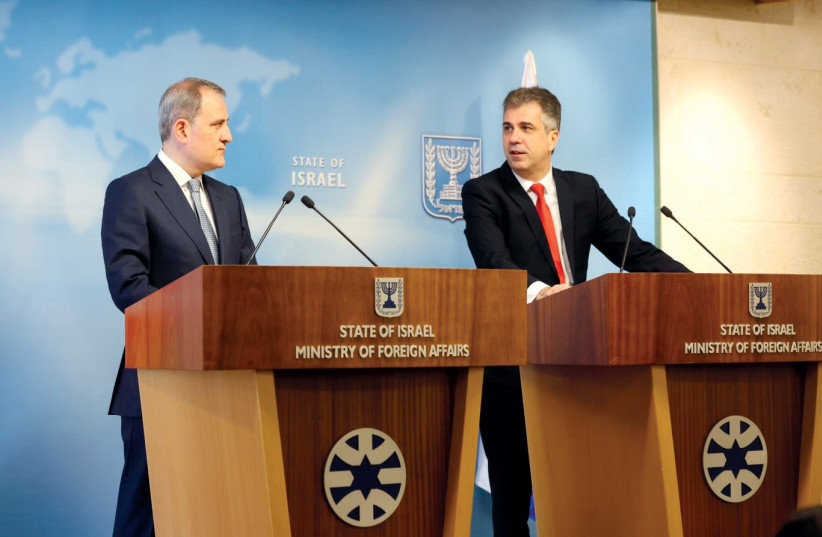14 Days: Ofek-13 launch

Israeli news highlights from the past two weeks.
OFEK-13 LAUNCH
Israel successfully launched the Ofek-13 satellite into space from a test site in central Israel early on March 29, the Defense Ministry announced. The satellite will provide the military with better-quality images than its predecessors. “The successful launch of the satellite is yet another important example of the Israeli defense establishment’s groundbreaking innovation,” said Defense Minister Yoav Gallant, who oversaw the launch despite being told by Prime Minister Benjamin Netanyahu three days earlier that he was being fired. “We will continue to prove that even the sky isn’t the limit for the Israeli defense establishment and that we continue to enhance its capabilities in every dimension in the face of various challenges.”
JERUSALEM SHOOTING
Jerusalem Police said Mohammed Elasibi, a 26-year-old resident of the Bedouin town of Hura, snatched the gun of a police officer and fired it twice before he was shot dead by officers at the entrance to the Chain Gate in Jerusalem’s Old City on the night of March 31. They said they had DNA evidence from the gun to prove this. Israeli Arab leaders declared a one-day strike to protest the shooting, while Palestinian sources dismissed the police account, claiming that Elasibi, who recently completed his medical studies in Romania, was shot in cold blood.
ZADOROV ACQUITTED
Roman Zadorov, 45, was acquitted on March 30 of the 2006 murder at a Katzrin school of 13-year-old schoolgirl Tair Rada, after a retrial that overturned previous convictions for which he served more than a decade in jail. In a 2-1 verdict broadcast live on television, a panel of three judges at the Nazareth District Court announced their decision to exonerate Zadorov, who burst into tears. “The truth triumphed,” he said. Rada’s family, which has consistently charged that the wrong person was convicted, waged a long public campaign that resulted in the announcement of a retrial in 2021, after which Zadorov was released to house arrest.
DIALOGUE SESSIONS
President Isaac Herzog hosted the first of a series of meetings between coalition and opposition teams on March 28 in an effort to find a compromise on legal reforms. The so-called “dialogue” talks came after the prime minister announced that he was suspending the judicial overhaul legislation until the beginning of the Knesset’s summer session, which starts April 30, to provide “a real opportunity for real dialogue.” Opposition leaders welcomed the legislative pause, with National Unity Party leader Benny Gantz declaring: “No to civil war, no to divisions, yes to agreement and dialogue.”
NATIONAL GUARD
Israel’s cabinet voted on April 2 for a 1.5 percent cut in the budgets of all ministries to establish a National Guard proposed by National Security Minister Itamar Ben-Gvir. A budget of NIS 1 billion was approved for the National Guard, which would act independently from the police and comprise about 2,000 service members, as well as a salary increase for some 3,000 police officers. Despite an outcry from the opposition, the attorney-general and the police, Ben-Gvir said the formation of a National Guard is “important news for Israeli residents and will improve personal security.” The prime minister promised Ben-Gvir he would bring the issue to a vote in exchange for his party remaining in the coalition despite his stiff opposition to a pause in the judicial overhaul legislation.
BIDEN’S CONCERN
Expressing concern over Israel’s judicial reform plans, US President Joe Biden said on March 28 that Prime Minister Netanyahu would not be invited to the White House in the near future. “Like many strong supporters of Israel, I am very concerned. I am concerned that they get this straight. They cannot continue down this road,” Biden said. “Hopefully, the prime minister will act in a way that he will try to work out some genuine compromise, but that remains to be seen.” In response, Netanyahu said: “The alliance between Israel and the United States is unbreakable and always overcomes the occasional disagreements between us.”
AZERBAIJAN EMBASSY
Azerbaijan became the first Shia Muslim country to open an embassy in Israel on March 29. “Israel and Azerbaijan share the same perception of the Iranian threats,” Foreign Minister Eli Cohen told his Azerbaijani counterpart Jeyhun Bayramov when they met in his Jerusalem office before the embassy’s opening in Tel Aviv. “The Iranian ayatollah regime threatens both our regions, finances terrorism and destabilizes the entire Middle East.” Israel is one of Azerbaijan’s leading arms suppliers, while Azerbaijan provides 30% of Israel’s oil.
Jerusalem Post Store
`; document.getElementById("linkPremium").innerHTML = cont; var divWithLink = document.getElementById("premium-link"); if (divWithLink !== null && divWithLink !== 'undefined') { divWithLink.style.border = "solid 1px #cb0f3e"; divWithLink.style.textAlign = "center"; divWithLink.style.marginBottom = "15px"; divWithLink.style.marginTop = "15px"; divWithLink.style.width = "100%"; divWithLink.style.backgroundColor = "#122952"; divWithLink.style.color = "#ffffff"; divWithLink.style.lineHeight = "1.5"; } } (function (v, i) { });

